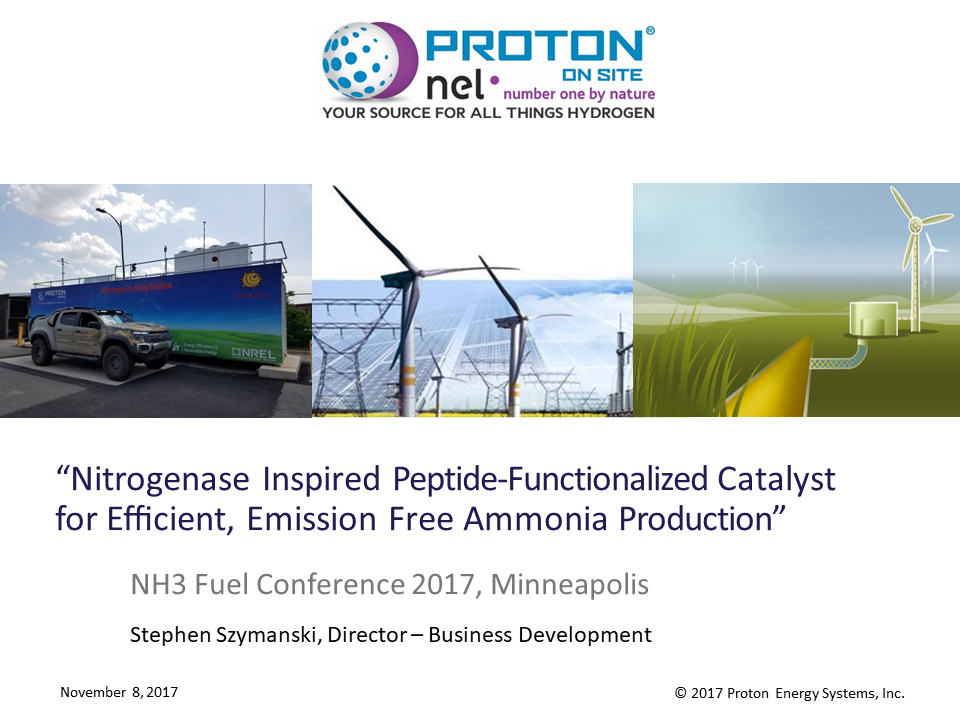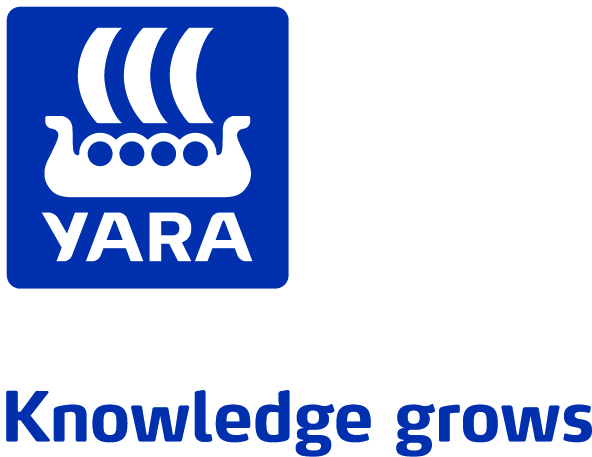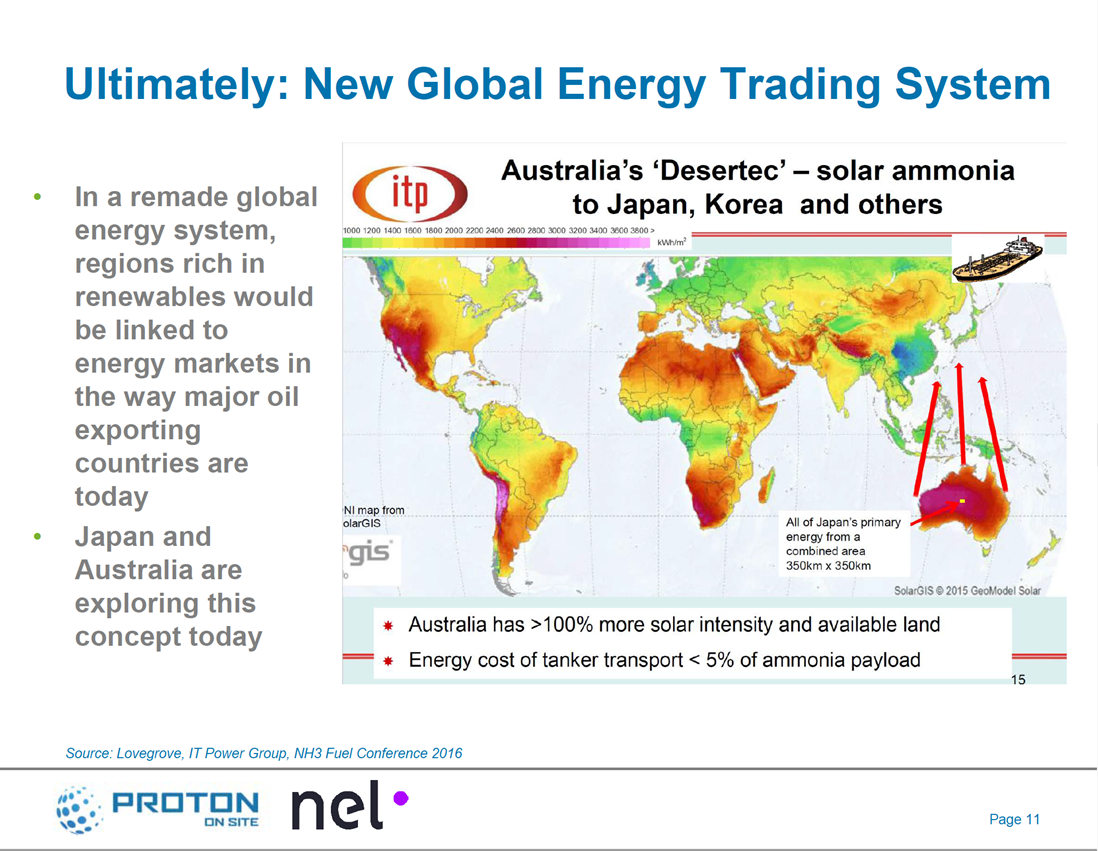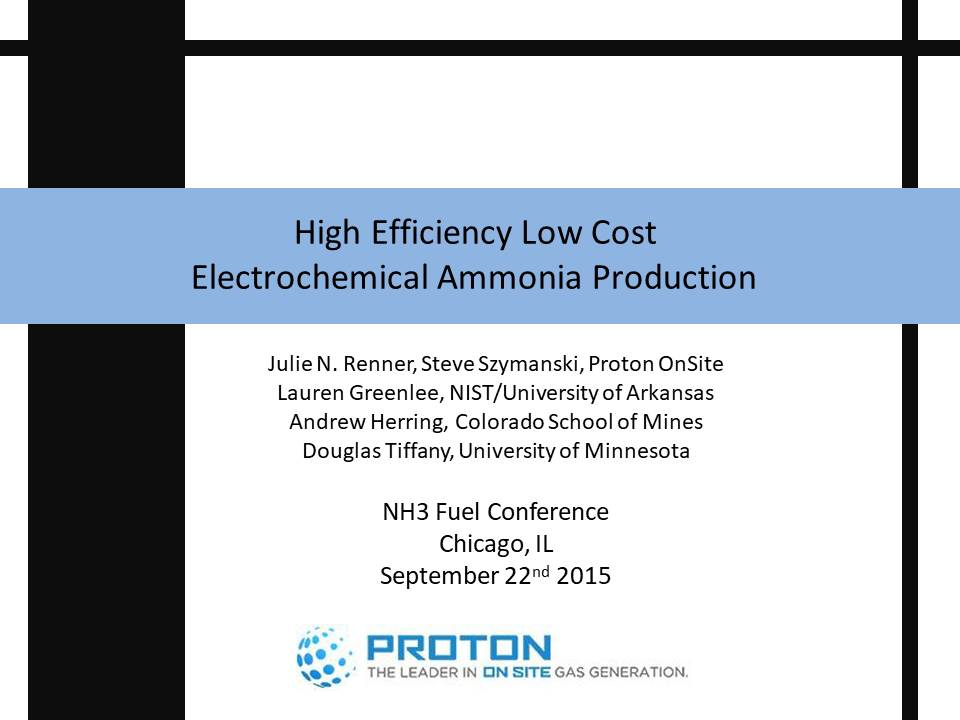The second annual European Conference on Sustainable Ammonia Solutions has announced its full program, spread over two days, May 17 and 18, 2018, at Rotterdam Zoo in the Netherlands. The international cadre of speakers, representing a dozen countries from across Europe as well as the US, Canada, Israel, and Japan, will describe global developments in ammonia energy from the perspectives of industry, academia, and government agencies.
Content Related to Proton OnSite
Article
Future Ammonia Technologies: Electrochemical (part 2)
Trevor Brown December 27, 2017
Last week, in Part 1 of this series on electrochemical ammonia synthesis technologies, I quoted a recent article by researchers at MIT that identified avenues for future research and development. One option was a biomimicry approach, learning from "enzymatic catalysts, such as nitrogenases," which can "either be incorporated into or provide inspiration for the design of electrocatalytic processes." The nitrogenase enzyme, nature's ammonia synthesis technology, was developed in an iterative innovation process, otherwise known as evolution, that took hundreds of millions of years to reach this level of efficiency. According to one group of electrochemists, who presented their results at the recent NH3 Energy+ conference, nitrogenase produces ammonia in nature with an enviable 75% process efficiency - so it's no surprise that they are basing their industrial technology on it.
Presentation
Exploring Peptide-Bound Catalysts for Electrochemical Ammonia Generation
Charles LoneyAshley GraybillCheyan XuJulie RennerPrashant AcharyaDavid SuttmillerLauren F. GreenleeLuke WilesKatherine AyersWayne Gellett
Today, most ammonia (NH3) manufacturing occurs via the Haber-Bosch process. This process consumes hydrogen from fossil fuels, and as a result NH3 contributes the highest amount of greenhouse gas emissions out of the top 18 large-volume chemicals made globally. Because the process is high temperature (400°–500°C) and pressure (150–300 atm) with a low (15%) single-pass conversion efficiency, the plants have to be very large to be economical. This means that ammonia is shipped from centralized locations, further increasing greenhouse gas emissions because of the fuel consumed in transportation. Additionally, their large size makes it difficult to integrate with renewable sources…
Presentation
Design of Iron-Nickel Nanocatalysts for Low-Temperature Electrochemical Ammonia Generation
Lauren F. GreenleeShelby FosterPrashant AcharyaDavid SuttmillerCharles LoneyJulie RennerWayne GellettKatherine Ayers
The Haber-Bosch industrial process for ammonia production is the cornerstone of modern commercial-fertilizer-based agriculture. Haber-Bosch ammonia fueled the global population growth of the 20th century, and approximately half of the nitrogen in human bodies today originates from ammonia-based fertilizer produced by the Haber-Bosch process. However, the Haber-Bosch process operates at high temperature and high pressure to achieve high conversion efficiencies, and the hydrogen input comes from steam reforming of coal or natural gas. In addition to the energy costs, the large production of carbon dioxide as a greenhouse gas and the large required economies of scale motivate research efforts to…
Presentation
Nitrogenase Inspired Peptide-Functionalized Catalyst for Efficient, Emission-Free Ammonia Production
Ammonia-based fertilizers have enabled increases in food production to sustain the world’s population. Currently the major source of ammonia is the Haber-Bosch process, which requires high temperature and pressure and has low conversion efficiency, such that very large plants are required for economical production. Ammonia is therefore one of the most energy and carbon intensive chemical processes worldwide, largely due to the steam methane reforming step to produce the required hydrogen. Because of the very large plant scale and resulting centralization of production, ammonia may also be transported long distances to point of use, adding additional energy and emissions. Distributed,…
Article
NH3 Fuel Association Announces Charter Sponsors
Stephen H. Crolius September 28, 2017
The NH3 Fuel Association (NH3FA) has released the names of the organization’s charter group of sponsors. The common thread that unites the six companies? A conviction that ammonia energy represents a significant opportunity for their businesses. The sponsors are Yara, Nel Hydrogen, Airgas, Haldor Topsoe, Casale, and Terrestrial Energy.
Article
Ammonia Energy at the H2@Scale Workshop
Stephen H. Crolius June 08, 2017
“Carbon-free ammonia needs to be a significant contributor to the H2@Scale initiative.” This was one of the “key takeaways” offered by Steve Szymanski, Director of Business Development at the hydrogen generator company Proton On-Site, during his presentation at the H2@Scale Workshop that was held on May 23-24 at the University of Houston in the U.S. By the time Szymanski left the podium, ammonia energy had moved a good distance from the periphery of the H2@Scale conceptual map toward its center.
Article
IEA calls for renewable hydrogen and carbon-free ammonia
Trevor Brown April 21, 2017
This week, an important new voice joined the chorus of support for renewable ammonia and its potential use as an energy vector - the International Energy Agency (IEA). In his article, Producing industrial hydrogen from renewable energy, Cédric Philibert, Senior Energy Analyst at the IEA, identifies a major problem with the hydrogen economy: hydrogen is currently made from fossil fuels. But his argument for producing hydrogen from renewable energy leads almost inevitably to ammonia: "In some not-too-distant future, ammonia could be used on its own as a carbon-free fuel or as an energy carrier to store and transport energy conveniently."
Presentation
High Efficiency Low Cost Electrochemical Ammonia Production
High Efficiency Low Cost Electrochemical Ammonia Production Stephen Szymanski, Julie Renner*, Proton OnSite, Lauren Greenlee, University of Arkansas








